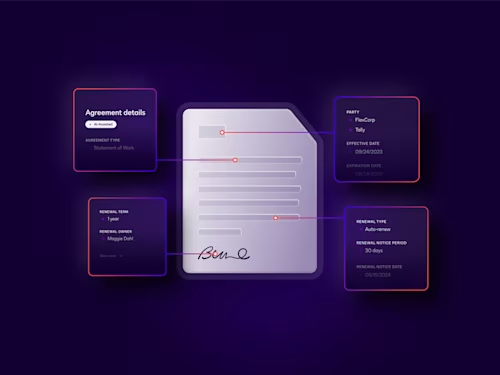
Trends and Challenges in Renewable and Efficient Energy
Learn how contract technologies can help renewable energy companies scale operations by generating and signing complex sales and financing agreements.

As energy costs rise and consumers, corporations and governments seek out alternatives to fossil fuels, the global renewable and efficient energy market is seeing tremendous growth. Renewables currently fuel 20% of the U.S.’s electricity, but experts expect this to rise to 42% by 2050. By 2025, they’re anticipated to become the world’s largest source of electricity.
For renewable energy developers and providers of efficient energy products and services, a more crowded landscape awaits, one that will require rapid differentiation. Companies that can adapt to trends quickly can find a wealth of opportunities in this growth period. By understanding the high-level shifts occurring in the market, you can better position your company to capitalize on the potential ahead.
The current trends
Recent heat waves in Texas laid bare the necessity of renewable energy. As heat records shattered, statewide energy demand soared. Solar and wind farms have been essential in alleviating the strain on the state’s electric grid—providing up to 15% of the state’s power. The role of renewables in energy production will continue to evolve and expand as climates warm.
Other factors shaping the renewable and efficient energy market in 2023 include:
Federal regulations: The most notable federal regulation is the Inflation Reduction Act (IRA), the largest investment in renewable energy in the country’s history. The IRA is estimated to spur 525-550 gigawatts of new clean power by 2030, enough to sustain 110 million homes, and puts the U.S. on track for a net-zero economy by 2050.
State regulations: States are shaping regional markets and fueling demand with their own regulations. Currently, 22 states and Washington, D.C. are targeting 100% renewable energy or 100% carbon-free electricity between 2040 and 2050. Over 30 states have renewable portfolio standards that require or incentivize energy providers to offer electricity from renewable sources.
Consumer preferences: New state and federal regulations are coinciding with a broad shift in consumer preferences toward clean energy. Rising electricity costs, weather-related power outages and tax incentives have prompted consumers to seek out alternative energy solutions. Through the IRA, consumers can access $43 billion in tax credits for EVs, rooftop solar, energy-efficient appliances, geothermal heating and more. According to findings from energy company SunPower, 88% of Americans would consider switching to solar.
Corporate expenditure: Corporations are also honing in on sustainable and clean energy sources with incentives from the IRA. Corporations are the biggest recipients of IRA tax credits, which total an estimated $216 billion.
Private investment: Finally, there’s been a rise in private investment as a result of the IRA and an expanding energy market. In 2022, private renewable energy investment hit an all-time high of $10 billion, making it easier than ever for developers to access funds for their renewable energy projects.
What’s the risk? Complexity and competition
The renewables market is highly competitive at the moment. To stay ahead, companies need to:
Scale operations to keep up with growing demand
Present differentiated, professional and innovative products and services
Offer modern and delightful customer and partner experiences
Achieving these goals can be challenging. Energy companies can experience a jump from 300 to 3,000 new customers in a single month, which severely strains staff and resources. There are many steps and stakeholders involved in these consumer processes, from home evaluations and design selections to financing options, installation and maintenance. Manufacturers as well as engineering and construction firms are also struggling to keep up with skyrocketing demand and compete with higher-margin industries for talent.
In addition to volume, energy company staff have to manage the complexity in residential and commercial sales. Consumer deals are governed by a wide variety of national, state, municipal and even international regulations that can differ by geography, utility company and even product. These variables make work difficult for shared services and operations teams, some of whom report spending over 100 hours a week on back-office processes and still can’t complete everything that needs to be done.
Finally, there are numerous parties involved in the renewable energy supply chain. Energy generators, manufacturers, engineering and construction firms, utility companies, distributors and dealers, financial and credit services, government funding agencies and regulators, and customers are often remote and geographically distributed, but all need to be efficiently managed to keep pace with escalating volume. For energy developers looking to get ahead, maintaining strong and efficient relationships and processes throughout the supply chain is essential.
Learn from other rapidly scaling industries
Capturing this timely market opportunity is possible, in part, by updating your processes through modern digital systems. To help you scale successfully, we’ve gathered pointers from companies that have been in your position before.
Close more deals, faster, with a reliable and mobile system
Imagine that your dealer has scoped out a project with a homeowner. They’re about to close the deal when something goes wrong: the contract becomes inaccessible, the form looks unprofessional, or the portal times out. Your customer expresses doubt and, in the worst-case scenario, backs out of the sale.
In this competitive time, creating and maintaining customer trust is paramount. You can do this by making it easy, quick, reliable, and enjoyable to close deals. Celonis, one of the world's fastest-growing business process optimization companies, experienced a similar challenge when onboarding new clients. They needed to close deals quickly, so they deployed an electronic signing tool for their mobile sales team that allowed customers to sign on any device.
The result was 70% faster time to signature, helping Celonis keep up with growing volume.
Consider re-evaluating your own processes for generating and signing complex residential and commercial sales and financing agreements. To make yours simpler and more reliable, you can:
Build templates for sales contracts, which can be easily accessed and require a light lift to maintain
Offer mobile signing through a secure platform with minimal downtime
Automatically populate documents with CRM data and save information inputted by consumers
Provide a reliable, multi-channel consumer and partner experience
Whether your customers buy online, in-store or through a representative at their residence or place of business, they should have a mobile-friendly, reliable, and easy experience. The same goes for your partners; because dealers and distributors are often non-exclusive and sell competing products, it’s important to make onboarding and closing deals with your products as easy as possible for them.
With a frictionless agreement process, you can reduce potential delays with both consumers and partners and more easily win in a competitive space.
After Metha Energia swapped its email-based customer registration process for a simple web-based clickwrap agreement, they increased customer acquisition by 36% and registration completion by 32%.
Improve back-office operations
Operations teams have a daunting number of tasks on their plates, from keeping up with a changing regulatory landscape to making sure systems work. Easing their workload can be the change your business needs to scale successfully. When back-office employees have a simple and automated agreement process in place, there is less chance of burnout and more time to contribute to strategic growth. An automated agreement process also reduces the chance of human error and risk exposure in the long term.
Take Vestwell, a 401(k) digital recordkeeping platform, for example. To continue to grow, Vestwell needed to efficiently manage a high volume of complex agreements.
After automating agreement processes, the Vestwell team could onboard clients faster, eliminating a major roadblock to scaling.
Here are a few ways you can follow their lead and accelerate back-office operations:
Deploy an attribute-driven workflow engine that gives you the right template based on data entered
Use a centralized and searchable repository to easily locate completed agreements
Automate tracking of obligations, delivery, payment terms and renewals to keep up with high sales volumes and rapid growth across locations
Integrate systems and workflows to trigger financing applications, credit checks or downstream installation work orders
Automatically push updates in your clause library en masse to relevant templates to reflect continual changes in state and federal regulations, and eliminate hours of manual updates.
How Docusign can help
Companies in rapidly scaling industries rely on Docusign’s trusted and secure technology to generate, sign, and manage customer agreements with eSignature, WebForms and Contract Lifecycle Management. Our solutions help companies on the cutting edge of innovation, with rapidly scaling volumes and the most complex processes and workflows, grow.
Sunrun, the leading residential solar company in the U.S., experienced the transformational impact Docusign can have firsthand. Suriya Gurumurthy, senior director of CRM engineering at Sunrun, noted, “We want to be the guide to take the customer through a 25-year relationship. Docusign plays a critical role in that process.”
As a company committed to sustainability, Docusign is a perfectly aligned partner for renewable energy developers. Since 2003, Docusign has helped hundreds of millions of people around the world replace over 20 billion sheets of paper with digital processes. Together, we have preserved over 2.5 million trees and 2.5 billion gallons of water that would otherwise have been used in the paper-making process. Let us help you fulfill your sustainability mission.Learn more about Docusign and its sustainable initiatives.
Related posts
Docusign IAM is the agreement platform your business needs


